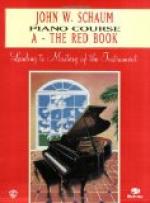“I can say—none. There is no necessity for using special means to acquire power; when everything is right you will have sufficient power; you cannot help having it. If you know the piece thoroughly, your fingers have acquired the necessary strength through efficient practise, so that when the time comes to make the desired effects, you have the strength to make them, provided everything is as it should be with your technic. Power is a comparative term at best; one pianist may play on a larger scale than another. I am reminded of an amusing incident in this connection. My son Paul, when a little fellow, was fond of boasting about his mother; I could not seem to break him of it. One day he got into an argument with another boy, who asserted that his father, an amateur pianist, could play better than Paul’s mother, because he ’could play louder, anyway.’ I don’t know whether they fought it out or not; but my boy told me about the dispute afterward.
“‘What do you think makes a great player?’ I asked him.
“’If you play soft enough and loud enough, slow enough and fast enough, and it sounds nice,’ was his answer. It is the whole thing in a nutshell: and he was such a little fellow at the time!
“As I said, you must have everything right with your technic, then both power and velocity will come almost unconsciously.”
(2) What do you do for weak finger joints?
“They must be made strong at once. When a new pupil comes to me the first thing we do is to get the hand into correct position, and the fingers rounded and firm. If the pupil is intelligent and quick, this can be accomplished in a few weeks; sometimes it takes several months. But it must be done. Of what use is it to attempt a Beethoven sonata when the fingers are so weak that they cave in. The fingers must keep their rounded position and be strong enough to bear up under the weight you put upon them. As you say, this work can be done at a table, but I generally prefer the keyboard; wood is so unresponsive.
“I think, for this work, children are easier to handle than their elders; they have no faults to correct; they like to hold their hands well and make them look pretty. They ought to have a keyboard adapted to their little delicate muscles, with action much less heavy than two ounces, the minimum weight of the clavier. As they grow and gain strength, the weight can be increased. If they should attempt to use my instrument with its heavy action, they would lame the hand in a few moments or their little fingers could not stand up under the weight.”
(3) Do you approve of finger action?




